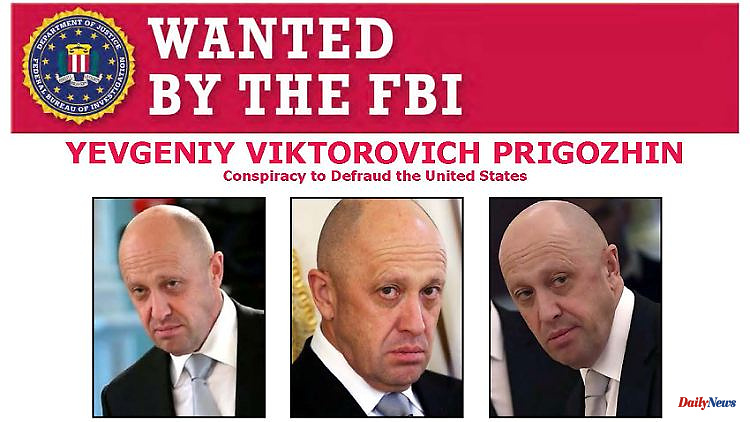The Wagner mercenary group is just part of Yevgeny Prigozhin's corporate network. Closely linked to the military company are above all commodity companies, which generate hundreds of millions of dollars in Africa and the Middle East. They have been on Western sanctions lists for years.
Yevgeny Prigozhin is one of the most sanctioned people in the world. Since 2016, the United States alone has issued no fewer than seven rounds of sanctions against the Russians, who are now openly the owners of the Wagner mercenary group. The oligarch has been on the FBI's most wanted list since February 2021, about a year before Russia invaded Ukraine. The EU, Great Britain and other countries have also imposed sanctions against Prigozhin and its associated companies for years. Despite all this, according to research by the "Financial Times", his international company network generates hundreds of millions of dollars.
For 2021, the profit of these Prigozhin-attributable companies was therefore more than 250 million dollars. The money comes mainly from deals in oil, gold, diamonds and other commodities from Africa and the Middle East. Revenues from Prigozhin's Russian operations, mainly the Concord catering company, are not included. Research by "FT", other media and organizations not only shows how closely Russian politics, the activities of the Wagner group and Prigozhin's other companies are connected. The largely unimpeded flow of funds despite years of international sanctions shows how difficult it is to enforce sanctions worldwide.
The example of Sudan makes it clear how Prigozhin proceeds. There, the regime in Khartoum sought support in Moscow when the power of the later toppled military ruler and internationally wanted war criminal Omar al-Bashir began to crumble. The first Wagner mercenaries arrived with military advisers to support the Sudanese military in fighting various insurgencies in the country, and representatives of a company called M Invest also arrived. This Prigozhin-controlled holding company, which has been sanctioned by the US since 2020, signed a contract with a company associated with the Sudanese military leadership for unspecified security services worth several million dollars a year.
What was actually behind this deal became clear in the years that followed. A subsidiary Meroe Gold soon rose to become the leading gold producer in Sudan. The military leadership supported the activities of Wagner, M Invest, and other companies not only with the necessary licenses for Meroe Gold, but also by allowing them, for example, to use Sudanese military aircraft and airports. The generals also reportedly ensured that some cargo planes taking goods out of the country for Prigozhin's companies went unchecked. The transports were carried out by companies with unsuspicious names that did not appear on the Western sanctions lists either, but which, according to the "FT's" research, can be assigned to the oligarch's network.
Presumably, gold worth millions, maybe billions, could be brought to Russia in this way without paying the 30 percent tax due. According to estimates by the Sudanese government itself, only a fraction of the gold mined in the country is officially exported. In 2019 alone, around four billion dollars worth of gold was smuggled abroad. Prigozhin has secured a significant share of this business. Considerations for the Sudanese military leadership could have flowed in the form of payments to their security company, among other things. M Invest officially generated the equivalent of 2.6 million dollars in 2021. Prigozhin also has potential income from smuggled gold deals and other activities in Sudan.
Very similar patterns can be observed in other countries. In Syria, for example, where Wagner fighters have been supporting the regime for years in the civil war, a company called Evro Polis, which belongs to Prigozhin according to the documents available to "FT", made a profit in the oil business of the equivalent of 90 million dollars in 2020 alone. In the Central African Republic, whose government has been largely dependent on the support of the Wagner fighters for years, Russian companies with proven or suspected connections to the Prigozhin network mine gold and diamonds and mine tropical timber. In all countries in which they are active, the Wagner fighters are accused of serious crimes ranging from torture and abuse to rape and murder.
The war in Ukraine, in which Prigozhin used thousands of Wagner fighters and many of them were killed, does not appear to be slowing down expansion. This becomes clear in Mali. After their coup in 2021, the military rulers brought Wagner fighters into the country and forced the western troops, who were annoying them, to withdraw. Here, too, Wagner sent geologists with the mercenaries. At least two companies associated with Prigozhin are said to have already started developing gold mines.
The Wagner business model is tempting for governments in poor countries, especially if they have fallen out with potential Western aid workers or are themselves suspected of serious war crimes. Instead of money, they can pay for military services with grant rights. "You don't have to withdraw any money from your account," Deutsche Welle quoted a member of the "All Eyes on Wagner" research collective as saying. "You can simply say: Here, you can exploit this mine for 25, 50 or 100 years without any problems."
Progozhin himself long denied having anything to do with Wagner or any other company. "Unfortunately" he doesn't own any gold mines. And the Wagner group is "just a legend," he told the New York Times last summer. A few weeks later he appeared publicly as Wagner founder and boss. He commented on the latest research by the "Financial Times" on Telegram. The reports of the British business newspaper are largely correct. However, he personally does not enrich himself in the business.












